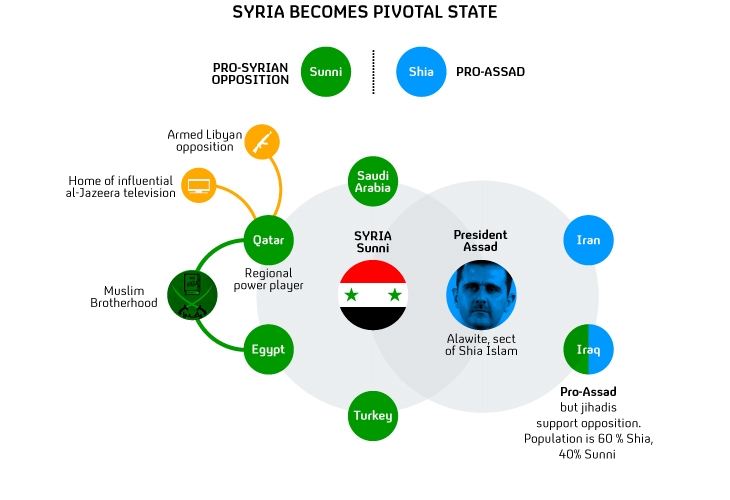Syria’s civil war: friends and enemies
With close ties to Iran and Lebanon, and with its physical proximity to regional powers like Egypt and Turkey, Syria is at the heart of a complex set of relations in the Middle East.

The UN General Assembly is meeting during a period of deadlock over the fate of Syria. The graphic above shows how, post-Arab Spring, political relations across the Middle East hinge on this critical pivot.
Saudi Arabia’s long-standing antipathy to Iran – its chief rival for dominance in the Persian Gulf and Middle East – has clouded its relationship with Syria.
The Saudi royal family has positioned itself as the protector of Syria’s Sunni majority in a country whose ruling elite is dominated by Alawis, members of a Shi’ite minority.
The danger is that the Syrian conflict could evolve into a proxy battleground between Saudi-supported Sunnis and the pro-Iranian Shi’ite/Alawi faction.
If the pro-Iranian Bashar al-Assad was to fall, it would undermine the activities of Hezbollah in Lebanon (which Saudi Arabia opposes) and of Hamas in Gaza (which Saudi Arabia also opposes).
Moral duty
Syrian-Egyptian relations were dealt a blow when Mohammed Morsi, Egypt’s newly elected president, announced to the non-aligned movement summit in Tehran in August that the world had a “moral duty” to back the Syrian opposition.
“We should all express our full support to the struggle of those who are demanding freedom and justice in Syria, and translate our sympathies into a clear political vision that supports peaceful transfer to a democratic system,” he said.
Relations between Syria and Iran are such that President Morsi’s words were inevitably seen as compounding Tehran’s international isolation. They also prompted a Syrian walk-out from the conference hall.
‘Politically dead’
Relations between Syria and Turkey, who share a border, have plummeted as a result of Syria’s civil war. In March Turkey recalled its Syrian ambassador, citing the deteriorating security situation.
Turkey says it has taken in more than 80,000 refugees from the Syrian conflict. What is more, Syria’s opposition has its base in Turkey, and earlier this month Turkish Prime Minister Erdogan told the Washington Post President Bashar al-Assad was “politically dead”.
There is an emerging power player in the region in the shape of Qatar which is providing both financial, and diplomatic help for a number of new or emerging regimes.
It is also the home of Al-Jazeera, the influential television news channel, giving it a powerful voice in a region where this matters more than most.